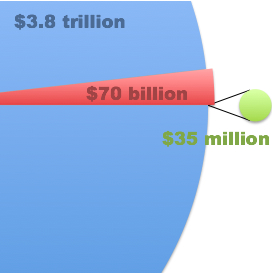 Using the recession as an excuse, the Republican leadership of the US House of Representatives is trying to destroy basically every government program they don’t like.
Using the recession as an excuse, the Republican leadership of the US House of Representatives is trying to destroy basically every government program they don’t like.
One of the proposed cuts could effectively cripple this website and similar experiments in online journalism.
According to Federal News Radio:
The White House requested $35 million for the e-government fund in 2011. The House allocated only $2 million in its bill, H.R. 1. The Senate, meanwhile, would provide $20 million for the e-government fund.
The e-government fund pays for some key government transparency websites. The most important of those, as far as War Is Business is concerned, is USASpending.gov, which tracks government contracts. USASpending has a lot of problems, but it remains the go-to source for a decade’s worth of federal contract data. It has quickly become a valuable tool not only for journalists, lawyers and bureaucrats, but for small businesses seeking to compete for those contracts.
To my mind, $35 million was already insufficient. Sunlight Foundation policy counsel Daniel Schuman told FNR that the cuts would ensure that the data on sites like USASpending
will slowly go out of date—and finally, as the money runs out, they’ll have to pull the plug. We could see the data disappearing off the internet.
That is not hyperbole. The stakes here are very high.
Transparency is essential to any government’s claim of legitimacy. Without a public accounting of government expenses and revenue, there can be no transparency. Money, as the saying goes, is power. Secret budgets are as democratic as secret laws.
The internet is becoming the dominant medium of the 21st Century. If detailed government spending data is not online, it is, in a practical sense, not really public at all.
For those reasons, pulling government spending data offline will weaken the nation’s already enfeebled democratic process.
Secrecy blowback
In much the same way that the government creates terrorist recruits by torturing prisoners and bombing civilians, the removal of public spending information from freely accessible online sources will fuel the dangerous and ultimately undemocratic efforts of self-aggrandizing info-vigilantes like Anonymous and Wikileaks.
If Congress kills online transparency programs now, Americans really will need hackers to tell them what’s going on.
That is my fear. I hate to say it, because I’ve been so critical of Wikileaks’ methods.
Most news organizations no longer have have the budget to file routine Freedom of Information Act requests, let alone fight for access to documents in court. For many working journalists and bloggers, once public data goes offline, it may as well be gone for good.
As the papers fill space with useless churnalism and the government removes public information from the web, stealing data and throwing it up online will begin to seem like a more reasonable approach to newsgathering. At the least, dumps of ill-gotten data will become more and more commonplace. Nobody who believes in an individual’s right to privacy should welcome that trend.
Enough speculation. What about the merits of the Republican proposal? Isn’t there a budget crisis? Isn’t it time to cut all but the most essential public services?
False savings
Here’s some important context to the debate, from a Government Accountability Office report that, just coincidentally, also came out last week (pdf).
The GAO analyzed the performance of 98 major Department of Defense acquisition programs, such as the Joint Strike Fighter, the Littoral Combat Ship and the Predator drone.
All together, the Pentagon’s total planned investment in such programs has risen to $1.68 trillion. That’s an amount equivalent to nearly half of what the federal government spends on everything in a year. War machines are a bigger expense than the bank bailouts.
GAO found that fewer than half of those major weapons programs “are meeting established performance metrics for cost growth.” Simply put, they’re running way, way over budget.
What’s worse, they’re not over budget because the Pentagon has decided to buy more of those high-tech jets, missiles and warships. They’re over budget due to mismanagement and incompetence—not to mention fraud and corruption.
The language in the report is more diplomatic:
“GAO found that a lack of technology maturity, changes to requirements, increases in the scope of software development, and a lack of focus on reliability were all characteristics of programs that exhibited poorer performance outcomes. …
[T]he total cost of the [major weapons purchasing] programs in DOD’s portfolio has grown by about $135 billion, or 9 percent, over the last 2 years, of which about $70 billion cannot be attributed to quantity changes.
 Got that? The Pentagon has wasted $70 billion on its biggest weapons programs since President Obama took office.
Got that? The Pentagon has wasted $70 billion on its biggest weapons programs since President Obama took office.
Why aren’t the Republicans screaming about that? And why aren’t the Democrats and the White House using these facts as ammunition in their own fight?
After all, the $70 billion in weapons waste accounts for nearly 2 percent of the annual federal budget. The $35 million for e-government amounts to zero percent.
Seriously. Without magnification, it doesn’t even show up on the Excel chart I made.
Politicians don’t care about these facts because there’s no powerful constituency pushing for increased government transparency.
However, there is an extremely powerful constituency—the defense industry—that is constantly pushing for increased military spending. And what looks to most people like Pentagon waste looks to Pentagon lobbyists like a down payment on a summer home.
Burying the next scandal before it happens
Who benefits if the open data websites disappear? Defense contractors do. So do their patrons in Congress. So do their lobbyist go-betweens.
Who loses? Pretty much everybody else.
Lockheed Martin, Boeing, Northrop Grumman, Raytheon, BAE Systems—the very companies that are raiding the US Treasury through cost-overruns on major weapons programs—are top donors to the campaigns of Republicans and Democrats alike.
That doesn’t mean there’s a grand conspiracy to kill a few transparency websites. Nobody at Lockheed said, “Let’s get rid of USASpending so it’s harder for guys like Bill Hartung to tell people what we’re up to.”
But surely no tears will be shed for the loss of the transparency sites in the boardrooms of major defense contractors. And I’ll bet that, as the Democrats hash out the budget with Republicans in Congress, many members would sooner sacrifice an obscure, $35 million transparency program than a pet project in their own districts.
That is why, instead of fighting the waste and corruption in military procurement, Congress is getting ready to kill a program that makes it easier to root out that corruption and waste.
You think the military-industrial complex is too powerful today? Wait until government contract data starts disappearing from the web. The next time the director of a major agency hands out a contract to her family company, you probably won’t even hear about it. And you may never know the next iteration of Blackwater.
OK. So I’ve got a cynical streak. But I’m still doe-eyed enough to believe that enough phone calls could change that grim outcome.
I’m usually a Scrooge when it comes to signing petitions and whatnot, but today I made an exception, and joined the Sunlight Foundation’s letter-writing campaign to “save the data.” I urge all readers of this website to do the same.
If you care to know who’s going to make a killing on the next war, signing their petition is worth 30 seconds of your time.